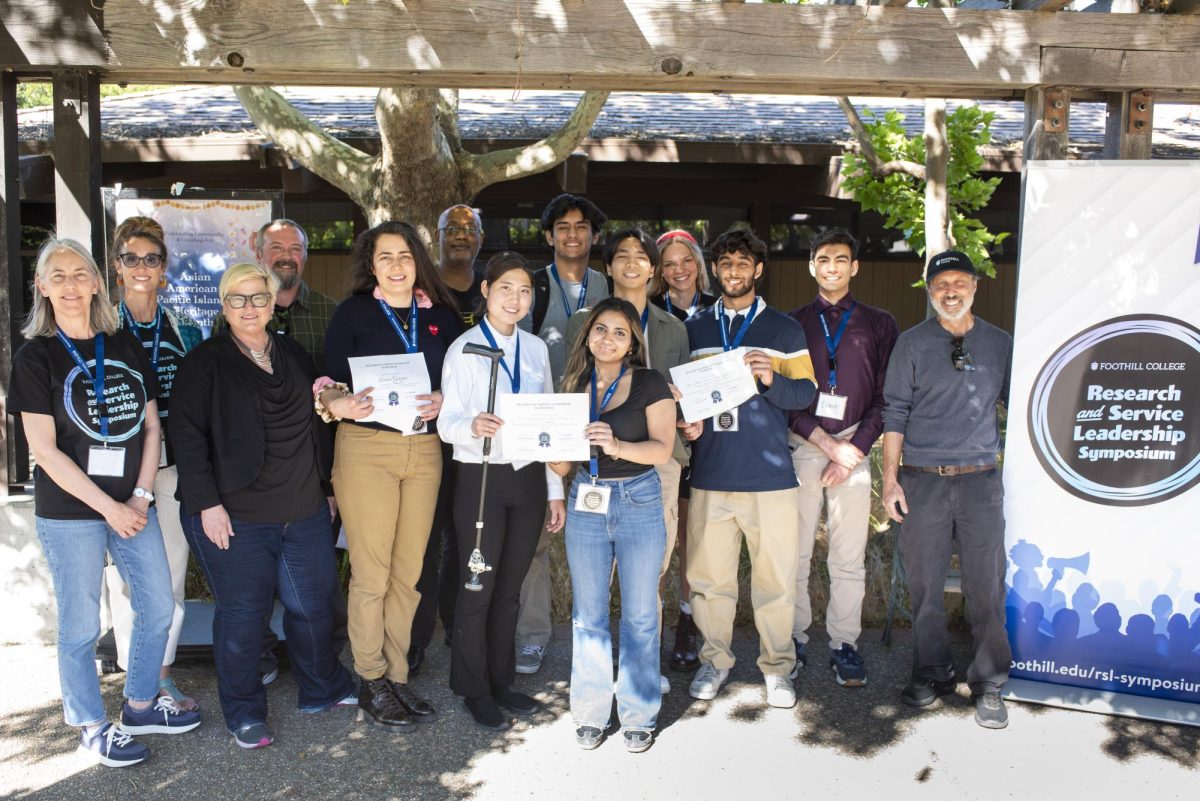Math Anxiety is Real
Math Anxiety is Real
…and this is what you can do about it
Do you start to sweat at the mere thought of a math test? What if I told you that there are scientific explanations for all of your fears and anxiety? And what if I told you that the statement “I’m not a math person!” simply is not true?
As children, students are often told as that math is their weakness. When a young student initially struggles in math, and their struggles are confirmed by teachers and other adults as an inherent lack of ability, a predisposed fear of the subject can be developed. A student’s own self-perception of their abilities becomes warped by adults around them. This perception follows students into adulthood, developing into a vicious cycle.
A cycle which shapes the student’s perception of themselves as bad at math.
As this cycle develops, it can induce a crippling fear of actually doing math. During a Women in STEM Presentation, Foothill Professor Katherine Duncan explained that when stress levels increase during a math exam for example, adrenaline is released in the body to activate the flight or fight response, the brain’s survival mechanism. When it comes to fight or flight, our brains do not distinguish the source of stress, they just register stress. This means that fight or flight responses could be triggered by a life-threatening situation, a spider, or, of course, a math quiz. This type of stress makes focusing on complex tasks — like math — very difficult, making performing well in academic settings a tall order.
Many students dreaming of a career in a STEM field might have second thoughts because of the amount of math required, and considering the crippling nature of math anxiety, who can blame them? So, as the hot summer days are leading us into a new exciting quarter, now is the best time to boost your confidence and set you up for success. Here are some tips to get rid of math anxiety once and for all:
- Be street smart and prepare
Professors usually send you the syllabus ahead of time or at least give it to you the first day of class. If not, be proactive and reach out to your future professors and ask how you can best prepare for the class. This gives you an opportunity to get ahead in your reading and get familiar with what will be covered in class. After this, you’ll find that things will make much more sense in the classroom. - Get help before it’s too late
Foothill has great resources for those who reach out their hands for help. The Foundations Lab is perfect if you are taking Math 220, 105, 48A or Statistics. The STEM center can help you with all your STEM related classes. And did you know that the STEM center also offers free printing if you are signed up for a STEM class. These places have everything you need, are open on Saturdays, and have free coffee. Make this your regular hang out spot! - Office hours are vital
Sometimes it might feel intimidating to ask questions in class. Instead, you can write your questions down and bring them to office hours. Professors want you to come and talk to them, and the opportunity to have your questions answered one on one with your professor is hugely helpful. Office hours are here to help you, so take advantage of them. - Study smart
Get to know yourself. Start by establishing where and when you get your best studying done. Are you a morning person? Do you need background noise in order to focus? Do you end up watching Netflix and napping if you try to study at home? Plan your schedule around what makes you most efficient to avoid that vicious stress.
Have you ever wondered why almost all classes at Foothill have a 10 minute break in the middle? It’s because your brain can’t focus for hours in a row. So keeping that in mind, no all nighters! Turn off distractions, set your timer, and go all in. You’ll be surprisingly effective when you know you’ll get a break reasonably soon.
Despite what you might think, study groups are actually very helpful! Creating a study group with your classmates can be invaluable because you classmates are there with you every day in class so they might understand the things you struggle with, and you might find the things they don’t get easy. That makes the perfect give and take situation where you can learn from each other, and you always learn better while explaining things to others. So don’t underestimate the power of a study group! Pro-tip! The STEM center at Foothill can help you create or join a study group. Then to will have a tutor helping you guys out during the session. (Read more about the STEM Center in our upcoming fall edition!)
This advice never gets old. Realizing the importance of taking care of yourself will take you far. Eating healthy, working out and getting enough sleep have an enormous impact on your energy and your academic performance.
The sources of math anxiety are related to your confidence so if you don’t have the confidence, fake it! If you have followed these steps, you might even be more prepared than you think you are. Our thoughts immediately affect our feelings and behavior so keep telling yourself that you got this and it will be reflected in your performance.
Photography by: Lane T. Plummer































































































Kimmy Salcedo
Oct 10, 2017 at 7:58 am
The title of the article, “Math Anxiety is Real” written by Tess Waerneman caught my attention the most since I am currently taking a math class this quarter and I figured that having an idea on how to get rid of that anxious feeling would benefit me a whole lot in the class. I experience lots of anxiety and every time I go through it not once was the feeling appreciated. The way Waerneman included tips on how to cope with anxiety was something I found very clever of her to do. Anxiety is real and is an important matter that many people go through so by including tips on how to get rid of anxiety only betters the overall piece of writing and brings sense to the reader whether or not he/she undergoes anxiety. Lastly, I would say that adding more research on anxiety (like statistics) would have been a good idea since it would have only been informing the reader more on anxiety and be considered as somewhat as background on the issue.
Karla Adame
Oct 10, 2017 at 7:24 am
Tess Waerneman
One point that stood out to me while I was reading your article was when you stated, “A student’s own self-perception of their abilities becomes warped by adults around them.” This stood out to me the most because I could connect with that and see how that personally affected me. Just by understanding how adults really do affect a young person to what they can and can’t do at school is so interesting. It makes me think that if they really understood how what they say really affects children why would they say those thigs instead of pushing them to do better. While reading this article I could look back on what I went through in my past and see how I was affected with. I also think that giving help to everyone at the end of your article is a good thing just in case anyone really needs help they can do something to help themselves. I think that something you can also talk about in the article is how extensive the anxiety can be not just with math but how it can easily spread to ore things and really affect you more than just one part of your school life. Overall this was a great article to read and it was very helpful to me.
Jasmin Flores
Oct 9, 2017 at 10:46 pm
Tess Werneman, a line that really got my attention was when you said, “As children, students are often told as that math is their weakness. When a young student initially struggles in math, and their struggles are confirmed by teachers and other adults as an inherent lack of ability, a predisposed fear of the subject can be developed.” That really caught my attention because this happens to a lot of students especially with math. You grow up thinking you aren’t good at math and that mind set just follows them throughout their whole education experience. Personally I relate to that comment so much because I’ve always gone through all my math classes saying how i’m not good at math, and i know that’s one of the reasons I’m not a big fan of math. If I can I try to stay as far as possible from math. It would like to know a bit more about how get over that weakness that grows onto you. I really enjoyed reading this article because I relate so much to most of the stuff it says.
Christopher Buenrostro
Oct 9, 2017 at 10:26 pm
The line that really stood out to me in this article was when the author Tess Waernemank stated that many students who wish to choose a career in the STEM industry tend to have second thoughts on it due to the extensive amount of math that is required. I found this statement interesting because I myself also wish to follow a career path in the STEM industry so I’ve had first hand experience of this because math is not my strongest subject. I also found this a bit insightful because for me and most likely others this line gives a sense of comfort knowing that you are not alone, and many people are going through almost the same thing as you and have gotten through it. To be completely honest I feel that this article covers everything when it comes to the topic math anxiety because it speaks on ways to deal with this issue and how people can develop it. It also gave a long list of ways you can deal with this issue with ways that are provided on campus so it was very beneficial.
Ria Vidyasagar
Oct 9, 2017 at 7:32 pm
The point that struck out to me is a student’s own self -perception of their abilities becomes warped by adults around them. This perception follows students into adulthood, developing into a vicious cycle. The reason why I choose this line is because I had the same problem with math phobia. The feedback that I gave the author is that he/she should provide more examples and ways of overcoming this phobia. The other feedback that I would give is the author would be he/she should provide more paragraphs explaining how the teachers should deal with this problem so that the students doesn’t loose his/her self esteem of not knowing math properly.
karen chavez
Oct 9, 2017 at 5:55 pm
In the script I read an article called “Math anxiety is real” by Tess Waerneman. The article’s title really struck out to me because math for me is subject that i personally struggle with. There is also a line that really got to me was on one of the tips which was “Eating healthy, working out and getting enough sleep have an enormous impact on your energy and academic performance.” I found this statement interesting because i don’t normally eat breakfast before coming to school and when i get to my first class of the day i have a hard time paying attention in class. Other times i eat breakfast before coming and i have more energy to focus in class without any problems. I believe the statement is true because your body needs to be active so that you can stay focus. I think the author needs to expand more on the stress levels and how it affects us. They should elaborate more on what stress means and how it builds up in our system.
Nancy Maldonado
Oct 9, 2017 at 5:02 pm
Hello Tess Waerneman ,
I am glad to read an article that relates to me. Not many people write about math because it already gives Math Anxiety but all your points are true. I praise your work, for having awareness that there is actually Math Anxiety. I find it interesting how you gave tips on how to cope with Math Anxiety and too not give up with your educational plan. I usually get worried when it comes to Math. I have never been a fan of Math but that doesn’t mean I don’t have to do it because I do. Reading your tips gave me more confidence to do my work more consistently and ask tutors for help. Seeking for help gives you more knowledge and boosts for confidence. For example, In my Math class I didn’t understand a word problem but I asked a tutor how it works and how to do it; then he easily explained it too me. I find the tips very helpful for me. Another tip is also taking breaks, because a body can’t just function 24/7 without a break. Taking a nap can be very helpful so your body and brain can rest 100%. My body only functions well if I get help and if I take breaks. Your article was very adviceful and helpful.